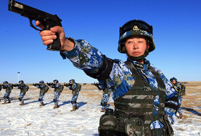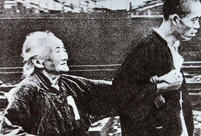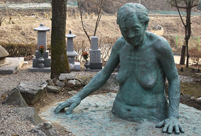 Fighters of Lanzhou MAC in confrontation training
Fighters of Lanzhou MAC in confrontation training
 3D printing to trigger third industrial revolution
3D printing to trigger third industrial revolution
 Top 10 brands that win rich women's hearts
Top 10 brands that win rich women's hearts
 Deng Xiaoping: 'I have a clear conscience all my life'
Deng Xiaoping: 'I have a clear conscience all my life'
 Xi Jinping: 'The people are our strength'
Xi Jinping: 'The people are our strength'
 Amazing cliff diving in cold winter
Amazing cliff diving in cold winter
 Enjoy Sochi 2014 in slow motion
Enjoy Sochi 2014 in slow motion
 University student sentenced to death for poisoning roommate
University student sentenced to death for poisoning roommate
 Chinese lunar New Year celebrated in San Francisco
Chinese lunar New Year celebrated in San Francisco
The company is among 308 pollutant discharging companies designated by the Tangshan municipal government to be shut down or reduce capacity in 2013 for failing to meet environmental standards.
Two of the company's five production lines have been ordered to be shut down, which will affect hundreds of workers' lives.
Reducing steel production capacity by the 40 million tonnes designated by the municipal government -- almost one-third of the city's total capacity -- will involve the resettlement of more than 400,000 people directly or indirectly engaged in the industry, according to Jiang Deguo, secretary of the Tangshan Municipal Committee of the Communist Party of China.
The government faces the pressing task of fostering new areas of growth to keep people employed.
UNITED, OVERALL SOLUTION
Smog caused by a GDP-obsessed growth model and massive illegal discharges has covered almost all provinces and municipalities in east China, said Qin Dahe, an academician of the Chinese Academy of Sciences.
"The unpleasant air pollution control has exposed the problem of management," said Qin, former head of China Meteorological Administration.
Qin called for the establishment of an effective trans-regional pollution control mechanism that can give early smog and pollution warnings and dynamically regulate emissions, he said.
The evaluation system for government and Party officials' performance, once focused mainly on GDP, must also be changed to hold local officials accountable for environmental damages, said Ai Nanshan, a professor at Sichuan University in southwest China's Chengdu City.
Efforts should also be made to eliminate outdated energy producers and industrial plants, which are the major source of air pollution, said Chen Guoying, head of the Hebei Provincial Environmental Protection Department.
China will cut outdated steel production capacity by a total of 27 million tonnes this year, slash cement production by 42 million tonnes and also shut down 50,000 small coal-fired furnaces across the country, according to the government work report delivered by Premier Li on Wednesday.
"The former path of high consumption and pollution and low profits has come to an end," said Yu Yong, head of the Hebei Provincial Metallurgical Industry Association.
Cutting capacity is bound to lead to enterprise closures, said Wang Chang, an NPC deputy and head of the Hebei Provincial Industry and Information Technology Department.
The government will prompt enterprise mergers and reorganization to produce big enterprises that will adopt the latest equipment in new factories, said Wang.
The industrial land saved from the mergers can be used to develop urban commerce, which the surplus workers can engage in to earn a living, he said.
"The resettlement of workers, debts and financing are problems the government has to face in its industrial upgrade and battle against pollution," said Chen.
"I hope the central government can give Hebei some special preferential policies," said Chen.
The saturated markets and fierce competition have also forced enterprises to transform.
Tangshan Iron and Steel Co., Ltd., the largest iron and steel producer in the city, is aiming at non-steel sectors for survival.
Since 2010, 16,000 workers, nearly half of the company's total payroll, have been resettled in 22 non-steel affiliated companies in LED manufacturing, logistics, information automation and liquefied natural gas.
"Our company will be a comprehensive industrial enterprise in the future, with steel as the basis," said Yu Yong, the company's chairman.

 Chaihe village, pure and peaceful fairyland in snow
Chaihe village, pure and peaceful fairyland in snow Belgians warmly welcome arrival of China's giant pandas
Belgians warmly welcome arrival of China's giant pandas Female marines receive tactical training in NW China
Female marines receive tactical training in NW China Blood memory: Nanjing Massacre in 1937
Blood memory: Nanjing Massacre in 1937 Top 10 pure beauties in showbiz
Top 10 pure beauties in showbiz British WWII veteran: I can't forgive Japan
British WWII veteran: I can't forgive Japan Tongban's dream of prosperity
Tongban's dream of prosperity Chinese frigate Yancheng holds drills in Mediterranean Sea
Chinese frigate Yancheng holds drills in Mediterranean Sea A visit to comfort woman's home in South Korea
A visit to comfort woman's home in South Korea Fairyland? Qingdao in sea of clouds
Fairyland? Qingdao in sea of clouds Top 10 most handsome faces in Asia in 2013
Top 10 most handsome faces in Asia in 2013 Female celebs with beautiful long legs
Female celebs with beautiful long legs Cat 'guardians' in Forbidden City
Cat 'guardians' in Forbidden City Large numbers of ancient coins excavated in Inner Mongolia
Large numbers of ancient coins excavated in Inner Mongolia Leisurely life beneath Zhonggulou, where time travels slower
Leisurely life beneath Zhonggulou, where time travels slowerDay|Week|Month